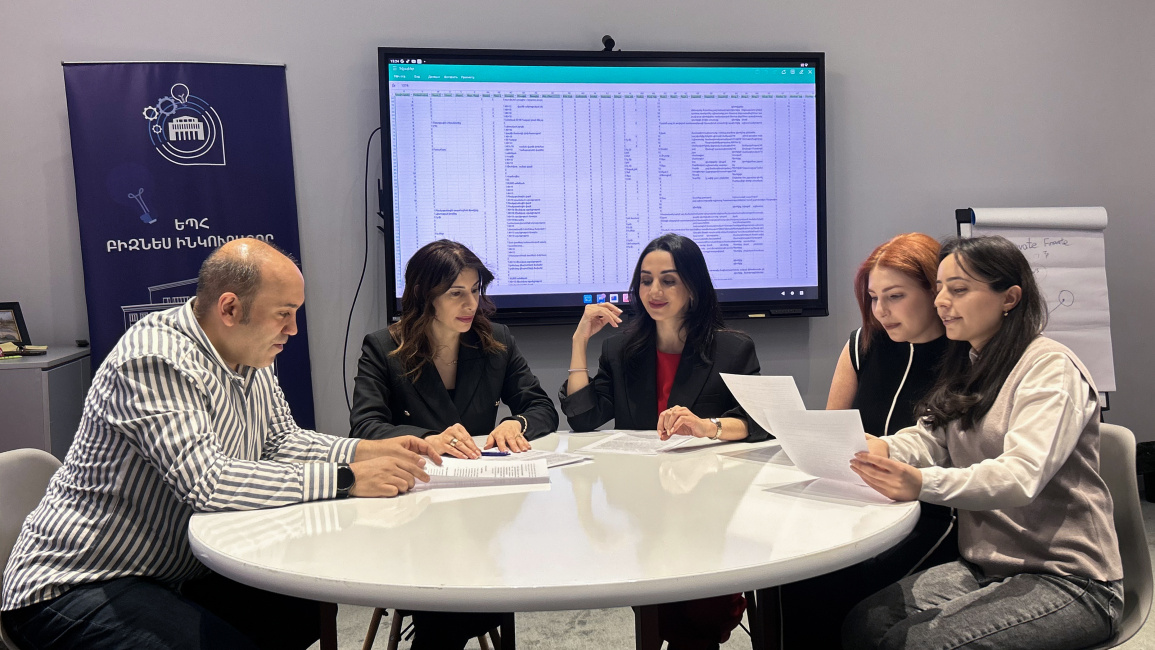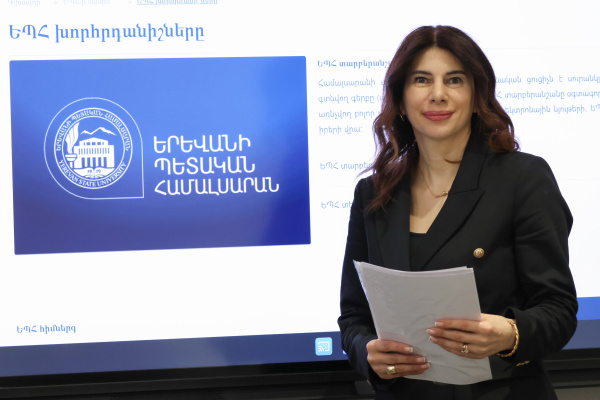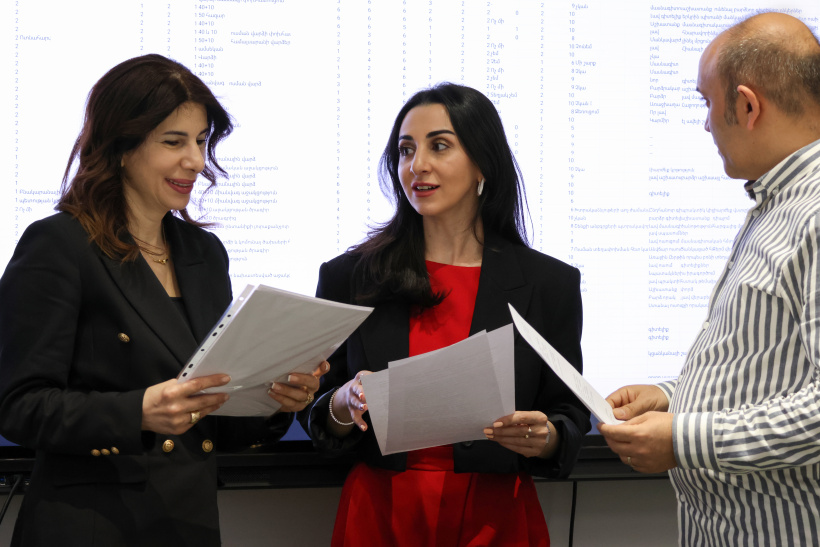April 08, 2025 | 15:00
Education
Research
Impact of displacement and integration into university life: Research findings summarized
The resolution of the economic and psychological challenges faced by students displaced from Artsakh and continuing their studies in Armenian higher education institutions, as well as adapting to a new environment, has been a priority for YSU researchers. To collect data on various issues, analyze them, and provide recommendations, YSU conducted a scientific study on the topic "Economic and Psychological Adaptation Challenges of Students Displaced from Artsakh in Higher Education Institutions."

Ensuring uninterrupted education for forcibly displaced students and overcoming the multifaceted issues arising from this process became a priority not only for educational institutions but also for the scientific community. In response to the situation, YSU took appropriate steps to ensure the educational inclusion of displaced students and to support their adaptation process. Understanding the factors that either hinder or facilitate the effective integration of students was especially crucial in such a complex situation.
To learn more about the topic selection for the scientific study and the work carried out, we spoke with Associate Professor Anna Hakobyan, Head of the Chair of Management and Business at YSU Faculty of Economics and Management, who is also the leader of the research group.
- Ms. Hakobyan, the internal academic grant competition at YSU for the 2023-2024 academic year was announced to address data collection, analysis, proposal development, and the formulation of solutions regarding the issues of students displaced from Artsakh. Could you tell us about the work that was done?
- The research topic "Economic and Psychological Adaptation Challenges of Students Displaced from Artsakh in Higher Education Institutions" was chosen for several reasons. First, a large number of students from Artsakh continued their studies at YSU Faculty of Economics and Management. These issues were in our field of view, with their various manifestations, such as integration, adaptation, and ensuring minimum living conditions, among others. Second, the economic knowledge and information collected from an economic perspective were perhaps insufficient to provide comprehensive solutions to these problems.

- Why was it decided to conduct the research combining economics and psychology? How was the research team formed?
- An interdisciplinary approach was a requirement of the grant program. It was crucial to study the issue from both economic and psychological perspectives, as forced displacement is accompanied by severe socio-psychological consequences, which are confirmed by the findings of our research. The research team includes Narine Mirzoyan, the Deputy Dean of the Faculty of Economics and Management and the Head of the "Management" bachelor’s program, who coordinates the work with Artsakh students at the faculty; Davit Hayrapetyan, Associate Professor in the Chair of General Psychology at YSU Faculty of Philosophy and Psychology, who played a significant role in developing the research methodology, particularly in the design of questionnaires and tests and the analysis of results. The research team also includes graduates of the mentioned faculties—master's students Mariam Dokhoyan and Marianna Sargsyan—who coordinated the work on data collection and the organization of testing for Artsakh students. The results obtained by the research team are largely due to teamwork.
- What are the main issues or problems you studied regarding the economic and psychological integration of students displaced from Artsakh?
- In the first phase, a theoretical study of the adaptation problems of students was conducted, which involved reviewing both local and international experiences and analyzing existing research. Considering the specific characteristics of the issue being studied, a new theoretical model for student integration, based on the reviewed models, was developed. In this phase, statistical analysis of students displaced from Artsakh was also carried out, including clarification of relevant data sources, data collection using established methods, and analysis of the collected information. In the second phase, the economic and psychological adaptation challenges faced by those students were identified. A sample was selected, questionnaires were developed and distributed, problems were classified, and the results of the survey were analyzed. In the third phase, data were grouped and analyzed using the Python software package, and the students' adaptation potential was assessed.

We spoke with Davit Hayrapetyan, Associate Professor in the Chair of General Psychology at YSU Faculty of Philosophy and Psychology, about the methods used in the research and the conclusions drawn.
- Mr. Hayrapetyan, what methods did you use to conduct this research?
- During the research, we used the survey method. More than two hundred Artsakh students participated in the survey from various higher education institutions in Armenia. The questions were based on a theoretical model. We examined their socio-economic status, civil status, participation in various processes, perception of the educational environment, attitude toward stress and risks, vision for the future, and psychological well-being.
- What conclusions did you draw from the research?
- One of our most important conclusions was that integration is a highly complex, multi-layered process. We often think that providing financial support or ensuring education is enough for integration to occur naturally. However, in reality, psychological factors are just as important, if not more so. For example, those who have already gone through high levels of stress and still do not have a clear vision for the future find integration much more difficult. They exhibited significant mistrust, both in themselves and in the system. Students who are dissatisfied with the educational system tend to participate less in social or civic initiatives and are more vulnerable under conditions of legal uncertainty, which makes them more likely to emigrate. On the other hand, students who are actively engaged in the educational processes and appreciate their achievements have a higher level of integration. They have managed to overcome past stressors, better control their environment, and are more self-confident. If a student believes that their actions will ultimately not make any difference, they will not even try to engage. This reduces both motivation and social connections. However, we also have hopeful data. For instance, active involvement in education and work contributes to psychological stability. These individuals think less about emigration. But when there is no stable educational or work future, emigration is seen not as an escape but as a rational step to realize one’s potential. The study shows that integration is possible only when work is being done simultaneously on social, educational, legal, and psychological levels. And it is this harmony that ensures stability.

- What solutions have you proposed based on the main findings?
- The results suggest that integration should be viewed as a complex issue that requires a multifaceted approach. Strengthening the economic and educational environment can significantly reduce the drivers of emigration. For example, if a student sees that they can find their place in the professional field after graduation, the idea of staying and contributing to society motivates them. Both the public and private sectors should work together to ensure reliable future prospects. The development of financial literacy, encouragement of entrepreneurship, and opportunities for continuous education are key components. On a psychological level, we propose creating supportive environments where students can discuss their traumas, stress, and fears about the future. Self-development and initiative should be viewed as skills that can be developed. Civic engagement is also crucial. When a student sees that their voice matters, they do not shy away from responsibility. To this end, we propose models of civic education, volunteering, and local leadership. We are currently working on a training program for students, which will be tested before the final phase of the research and will help develop the above-mentioned skills.
We also spoke with Narine Mirzoyan, Associate Professor in the Chair of Management and Business at YSU, about the steps being taken to mitigate the identified issues.
- How do you perceive the solutions to the economic and psychological adaptation challenges faced by students displaced from Artsakh in higher education institutions, particularly at YSU?
- Following the tragic events of September 2023, over 200 students from Artsakh expressed their desire to continue their studies at YSU Faculty of Economics and Management. It is difficult to describe the emotional state of Artsakh students during that period, and although no one had a clear understanding of how the relocation process would unfold—how issues such as tuition fees and subject differences would be resolved—at YSU and in the faculty, there was a clear understanding that we would accept the students under any circumstances, taking on the responsibility to resolve all the complex problems. As a result, through the extensive teamwork of each department and faculty leadership, as well as the professors involved in the relocation process, 212 Artsakh students were able to continue their studies successfully. However, this was only the initial phase of adaptation. Afterward, students had to enhance their knowledge base by attending the ongoing semester's classes alongside new students, for which the faculty organized appropriate consultations. The third phase is still ongoing, where efforts are being made to involve Artsakh students in all initiatives within the faculty and respond quickly to all types of emerging issues. I believe that if the processes of relocation and adaptation in universities had been made more complicated, some students would not have continued their studies, which would have been unacceptable for everyone, especially considering the psychological aspect.
- In your opinion, what additional steps can YSU take to mitigate or reduce such problems?
- First, it is important to mention that YSU has compensated about 30% of the tuition fees for our students from Artsakh for the 2023-2024 academic year. The faculty is conducting continuous work, especially for fourth-year students, to help them secure employment in their field. Additionally, the timely organization of a thematic grant on this issue has been very important, as it allowed researchers to conduct a deeper analysis of the psychological and economic issues faced by students from Artsakh and to present possible solutions.
The results of the first and second phases of research conducted as part of YSU’s internal grant have been published in various Armenian journals. The article prepared based on the results of the third phase has already been submitted for publication in a prominent journal with a high impact factor.
By presenting the results of the study at various platforms, the research group members are preparing to participate and present their findings at the upcoming international conference "Science Days", to be held from May 5-8 this year, at Kazan National Research Technological University.

